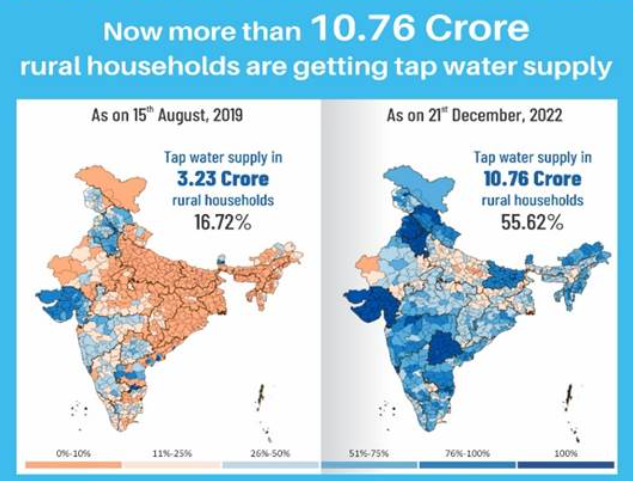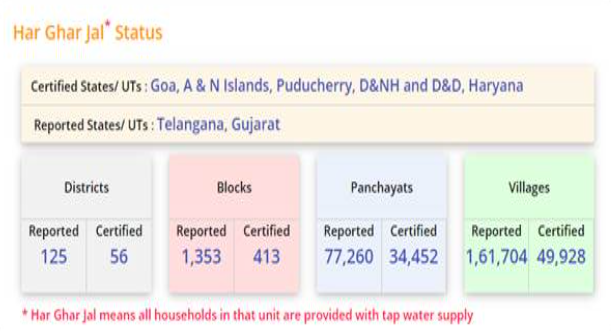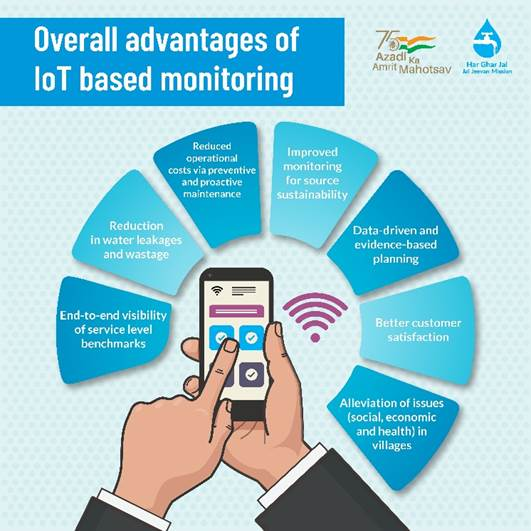Governance
Department of Drinking Water and Sanitation Year End Review 2022
- 28 Dec 2022
- 9 min read
For Prelims: Jal Jeevan Mission, Swachh Bharat Mission, Achievements of Department of Drinking Water and Sanitation
For Mains: Year End Review of Department of Drinking Water and Sanitation, Achievements of Jal Jeevan Mission and Swachh Bharat Mission
Why in News?
Recently, the year-end-review of the Department of Drinking Water and Sanitation under the Ministry of Jal Shakti, Jal Jeevan Mission (JJM) & Swachh Bharat Mission - Grameen (SBM - G) for the year 2022 was released.
What are the Key Achievements of the JJM?
- Coverage Under Jal Jeevan Mission:

- As on 21st December 2022, under the Jal Jeevan Mission, more than 10.76 Crore (55.62 %) of rural households are being provided with tap water connection in adequate quantity, of prescribed quality on a regular basis.
- Four States namely Goa, Telangana, Gujarat, and Haryana and 3 Union Territories of Puducherry, Daman & Diu and Dadra & Nagar Haveli and Andaman & Nicobar Islands, reported as “Har Ghar Jal”, i.e. Every rural household has provision of tap water supply.
- Goa becomes the First ‘Har Ghar Jal’ Certified State & Dadra & Nagar Haveli and Daman & Diu becomes the First ‘Har Ghar Jal’ Certified Union Territory (UT) in India in August, 2022.
- Burhanpur District of Madhya Pradesh becomes the first ‘Har Ghar Jal’ certified district in India in July, 2022.
- Har Ghar Jal Certification:

- Once a village is declared as “Har Ghar Jal”, the Gram Panchayat of that village conducts a special Gram Sabha and passes a resolution with the concurrence of all the village members that all the households, schools, Anganwadi, and public institutions in their village have functional tap connection and thus declare themselves as “Har Ghar Jal Certified”.
- Coverage of Potable Tap Water to JE-AES Affected Districts:
- The government of India accords priority to Japanese Encephalitis (JE)-Acute Encephalitis Syndrome (AES) affected Districts to ensure potable tap water supply in all the households under Jal Jeevan Mission.
- In 61 districts affected with JE/AES across 5 states, tap water connection increased from 8 lakh (2.69%) to 147.14 lakh (49.29%) households, resulting in improvement in the health profile of the rural population of these areas.
- Status of Water Quality Monitoring and Surveillance:
- There are a total of 2,074 water testing laboratories in the country. Of these, 1,005 are National Accreditation Board for Testing and Calibration Laboratories (NABL) accredited.
- Implementation Support Agencies (ISAs):
- The States/ UTs are extending support to the Panchayats by engaging Implementation Support Agencies (ISAs) to facilitate constitution of Village Water Sanitation Committee (VWSC), under participatory rural appraisal for community mobilization, support in preparing Village Action Plan and carry out activities post infrastructure construction.
- About 14 thousand ISAs have been engaged, which are actively working in the field.
- The States/ UTs are extending support to the Panchayats by engaging Implementation Support Agencies (ISAs) to facilitate constitution of Village Water Sanitation Committee (VWSC), under participatory rural appraisal for community mobilization, support in preparing Village Action Plan and carry out activities post infrastructure construction.
- National WASH Expert:
- National Centre for Drinking Water, Sanitation, and Quality has been entrusted with the task of empanelment and deployment of National WASH Experts for ground truthing and technical assistance to States in the implementation of the Jal Jeevan Mission (JJM).
- During 2022, 62 teams have visited around 1,035 villages for ground truthing of the implementation work done under JJM.
- Use of Technologies for Drinking Water Supply and Water Quality:
- JJM focuses on various technologies for the community-led implementation of:
- Source sustainability measures such as aquifer recharge, rainwater harvesting, increased storage capacity of water bodies, reservoirs, desilting, etc. to improve the lifespan of water supply systems.
- Technologies like Internet of Things (IoT) for Supervisory Control and Data Acquisition (SCADA), remote sensing, and design software have been used in building climate resilience through water accounting, water quality control, water use efficiency, water resource planning, and impact assessment.
- JJM focuses on various technologies for the community-led implementation of:
- Grievance Redressal Mechanism:
- Grievance Redressal Cell has been constituted in the Department to address the grievances related to the water supply. People are lodging their complaint through the Centralized Public grievances Redress and Monitoring System (CPGRAMS).
- Jeevan Survekshan (JJS) Toolkit:
- The Vice President of India launched ‘Jal Jeevan Survekshan’ toolkit and dashboard on 21st October, 2022.
- The purpose of Jal Jeevan Survekshan 2023 is to incentivize States/ Districts functionaries to strive for better performances and improved water service delivery in rural areas.
What are the Key Achievements of Swachh Bharat Mission (Grameen)?
- About SBM (G):
- Swachh Bharat Mission (Grameen), a Centrally Sponsored Scheme, was launched by Prime Minister 2nd October, 2014, with the main aim to make the country Open Defecation Free (ODF) by 2nd October, 2019, the 150th birth anniversary of Mahatma Gandhi, by providing access to toilets to all the rural households in the country.
- All the villages in the country had declared themselves ODF by 2nd October, 2019.
- Swachh Bharat Mission (Grameen), a Centrally Sponsored Scheme, was launched by Prime Minister 2nd October, 2014, with the main aim to make the country Open Defecation Free (ODF) by 2nd October, 2019, the 150th birth anniversary of Mahatma Gandhi, by providing access to toilets to all the rural households in the country.
- Achievements:
- Around 1.25 lakhs villages declared Open Defecation Free (ODF) Plus between 1st January, 2022 to 20th December, 2022.
- To prioritize Liquid Waste Management “Sujlam” campaign was launched.
- Under Sujlam 1.0 and Sujlam 2.0 campaigns, more than 23 lakh soak pits were constructed.
- Under the “GOBARdhan” initiative of SBM(G), 96 community/cluster level Biogas Plants have been established since January 2022.
- GOBARdhan’s objective is to ensure cleanliness in villages and generate wealth and energy by converting bio-waste including animal waste, agri-residue into bio-slurry and biogas and to improve the lives of villagers.
- The Department of Drinking Water and Sanitation (DDWS) is also coordinating the implementation of GOBARdhan: Waste to Wealth initiative involving various Departments/ Ministries to provide an enabling environment for the Biogas/Compressed Biogas (CBG) sector.
- Retrofit to Twin Pit Abhiyan:
- Retrofit to Twin Pit Abhiyan was launched by Union Minister of Jal Shakti on 2nd October 2022.
- The campaign will promote the safe disposal of faecal sludge through a simple on-site methodology of retrofitting single pit toilet to twin pit toilet.
- During the first phase of the Campaign from 2nd October - 19th November 2022, States have completed the baseline assessment of 97% villages.
- Swachh Survekshan Grameen 2023 (SSG 2023):
- DDWS has launched Swachh Survekshan Grameen (SSG) 2023 on 2nd November 2022 with an objective to create healthy competition amongst States, Districts and Gram Panchayats and to ascertain progress of SBM-G Phase II.
- Under SSG 2023, assessment will be undertaken at Gram Panchayat and District level.
- To make SSG 2023 more participatory, Gram Panchayats will undertake village self-assessment on ODF Plus parameters.
UPSC Civil Services Examination Previous Year Question (PYQ)
Q. “To ensure effective implementation of policies addressing the water, sanitation and hygiene needs the identification of the beneficiary segments is to be synchronized with anticipated outcomes.” Examine the statement in the context of the WASH scheme. (150 words) (2017)





